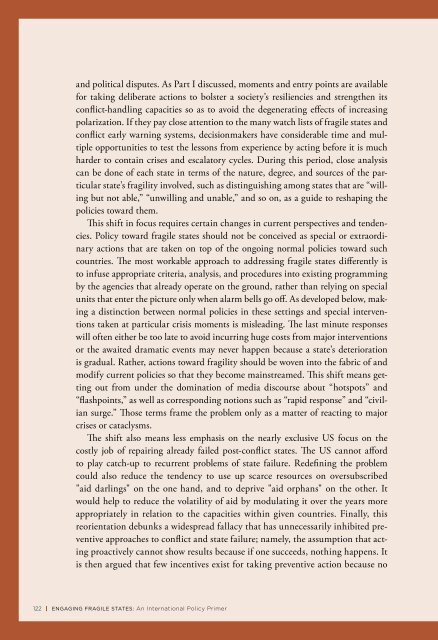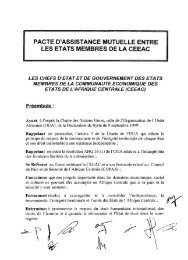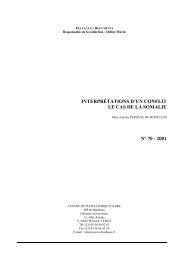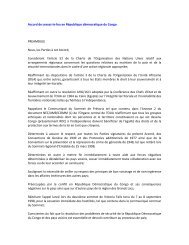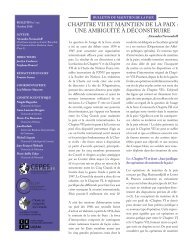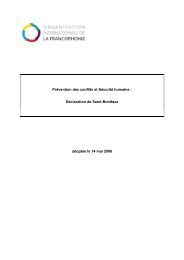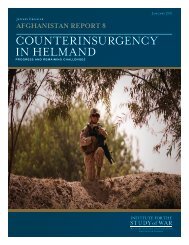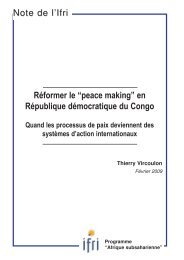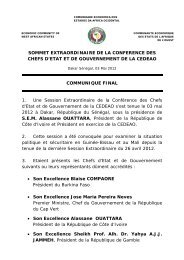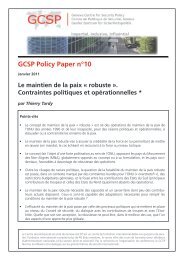engaging fragile states - Woodrow Wilson International Center for ...
engaging fragile states - Woodrow Wilson International Center for ...
engaging fragile states - Woodrow Wilson International Center for ...
You also want an ePaper? Increase the reach of your titles
YUMPU automatically turns print PDFs into web optimized ePapers that Google loves.
and political disputes. As Part I discussed, moments and entry points are available<br />
<strong>for</strong> taking deliberate actions to bolster a society’s resiliencies and strengthen its<br />
conflict-handling capacities so as to avoid the degenerating effects of increasing<br />
polarization. If they pay close attention to the many watch lists of <strong>fragile</strong> <strong>states</strong> and<br />
conflict early warning systems, decisionmakers have considerable time and multiple<br />
opportunities to test the lessons from experience by acting be<strong>for</strong>e it is much<br />
harder to contain crises and escalatory cycles. During this period, close analysis<br />
can be done of each state in terms of the nature, degree, and sources of the particular<br />
state’s fragility involved, such as distinguishing among <strong>states</strong> that are “willing<br />
but not able,” “unwilling and unable,” and so on, as a guide to reshaping the<br />
policies toward them.<br />
This shift in focus requires certain changes in current perspectives and tendencies.<br />
Policy toward <strong>fragile</strong> <strong>states</strong> should not be conceived as special or extraordinary<br />
actions that are taken on top of the ongoing normal policies toward such<br />
countries. The most workable approach to addressing <strong>fragile</strong> <strong>states</strong> differently is<br />
to infuse appropriate criteria, analysis, and procedures into existing programming<br />
by the agencies that already operate on the ground, rather than relying on special<br />
units that enter the picture only when alarm bells go off. As developed below, making<br />
a distinction between normal policies in these settings and special interventions<br />
taken at particular crisis moments is misleading. The last minute responses<br />
will often either be too late to avoid incurring huge costs from major interventions<br />
or the awaited dramatic events may never happen because a state’s deterioration<br />
is gradual. Rather, actions toward fragility should be woven into the fabric of and<br />
modify current policies so that they become mainstreamed. This shift means getting<br />
out from under the domination of media discourse about “hotspots” and<br />
“flashpoints,” as well as corresponding notions such as “rapid response” and “civilian<br />
surge.” Those terms frame the problem only as a matter of reacting to major<br />
crises or cataclysms.<br />
The shift also means less emphasis on the nearly exclusive US focus on the<br />
costly job of repairing already failed post-conflict <strong>states</strong>. The US cannot af<strong>for</strong>d<br />
to play catch-up to recurrent problems of state failure. Redefining the problem<br />
could also reduce the tendency to use up scarce resources on oversubscribed<br />
"aid darlings" on the one hand, and to deprive "aid orphans" on the other. It<br />
would help to reduce the volatility of aid by modulating it over the years more<br />
appropriately in relation to the capacities within given countries. Finally, this<br />
reorientation debunks a widespread fallacy that has unnecessarily inhibited preventive<br />
approaches to conflict and state failure; namely, the assumption that acting<br />
proactively cannot show results because if one succeeds, nothing happens. It<br />
is then argued that few incentives exist <strong>for</strong> taking preventive action because no<br />
122 | Engaging Fragile States: An <strong>International</strong> Policy Primer


